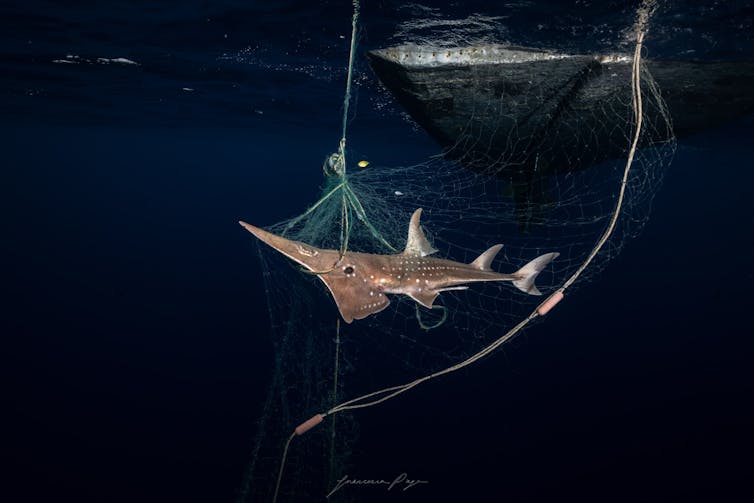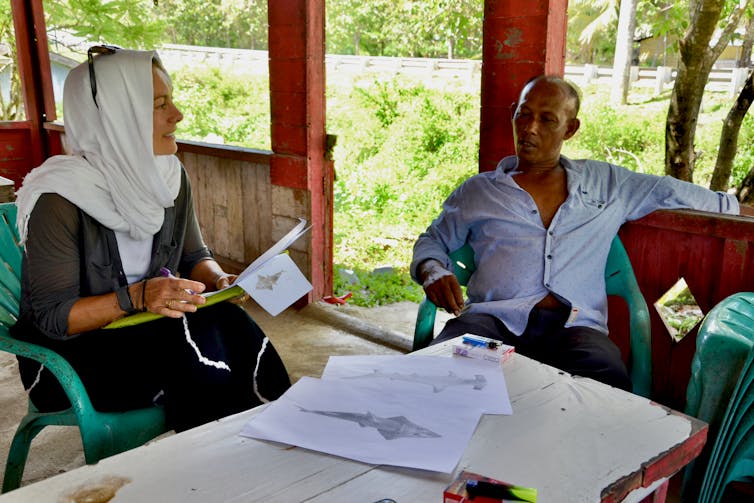The fishermen can be pushed to release the sharks that were accidentally arrested in their nets to stimulate the preservation procedures – but there is hunting

[ad_1]
Sharks and radiology are among the most threatening species in the world, mainly due to Overfishing. It is sometimes targeted for their teasers and meat, but it is often caught as a friend in the nets that aim to hunt other fish. Decline in these predators in the ocean Break Food networks, damage Tourism entered and It gets worse Climate change by undermining the ecological systems of oceans.
However, stopping overfishing in sharks and radiation is difficult because the surrounding social dynamics complicated. Many species threatened in small fish fisheries and mixed species are discovered in tropical coastal areas, where families depend on fish that hunt them-including sharks and endangered radiation-food and income.
Over the past five years, I have been investigating how to support marine life and people who depend on fishing. I am part of a global team of multidisciplinary researchers focusing on the reduction of sharks and conservation in small fish fisheries in Indonesia.
our New study,, Which was just published in Science Advances, indicates that pushing fishermen to launch endangered species can stimulate preservation behaviors and enhance fishermen’s care. However, these payments can also have unintended consequences, which may undermine memorization objectives, so it is really important to design incentives carefully and accurately in assessing initiatives as they advance.

Francesca page
Although sharks and radiology are not necessarily targeted by fishermen on a small scale, threatened species such as fish and hammer sharks are frequently captured. In our 2020 studiesThe fishermen often told us that the sorry fish and the heads of the hammer are “just hunting from hunting”. However, more investigations revealed that fishermen are still hesitant to reduce the fishing of these types because they will do Loss of food and income.
“It brings more money although it is not the goal.” Someone Fischer told us. “that it Risiki((A gift from God). ” If you go back to the ocean, then it is Mobzer(Matta, and God will feel the recovery).
Knowing this, we discovered the different positive and negative incentives that may stimulate Fishermen to change their behavior. We have found that the conditional cash payments, which compensate the fishermen for issuing the names of the fish and the heads of the hammer again in the sea, could be a An effective way in terms of cost To maintain these types without damaging the livelihoods of the hunters.
Inspired by our results, I worked with students and collaborators to create a small local charitable organization to develop the results we reached – Kebersamaan untuk lautan (An Indonesian phrase means “collective work of the ocean”). We agreed to compensate the fishermen who have cash payments-usually 2-7 USD (1.50-5 pounds) for each fish-if they are presented Videos From the peer and the head of the hammer are safely released.
Incentive test
However, incentives can change fishing behavior in unexpected ways. For example, fishermen may increase their trap to receive more payments at the expense of preservation targets. Payments may also end up with people who will be hungry anyway, or they can launch budget restrictions, allowing Fishers to purchase more nets.
To see if the memorization payments and how they work in practice, we have done a An experience that controls itDivide 87 ships from ACEH and West Nusa Tendgara into two groups. One group was offered to compensate for live versions while it was not the other. We have collected data on the reported versions of the reported and the fishing fish and the heads of the hammer, and on the levels of satisfaction with the fishermen on the program and life in general. Then we compared the two groups.
Since we launched the payment program to release in May 2022, more than 1,200 fish and used in fish and safety were released. All the participating fishermen and their families felt satisfied.
“We use compensation funds to cover our daily needs. We hope the program will continue in the future,” Fischer’s wife said.
https://www.youtube.com/watch?
but, Our experimental data From the first 16 months of the program (May 2022 – July 2023) it revealed the development of a plot. Although the living releases that stimulate compensation, indicated that some fishermen have intentionally increased their trap to obtain more payments.
My team and I at first felt sorrowed because of the result. However, without the strict controlled experience, we did not discover these unintended consequences. Based on our results, we reviewed the compensation pricing and limit the number of versions that each ship can claim a week. We also experiment with the new gear swap scheme, as fishermen trade their nets for fish traps, which have much lower accuracy rates. Initial data indicates that these changes have strengthened the effectiveness of the program.

Our team in Oxford is closely working with local researchers and other memorization organizations to help them design and evaluate appropriate incentive programs locally. Another recent study from a charity for memorization Thresher Shark Indonesia It explains that their alternative livelihood program reduced the endangered shark fish More than 90 %.
Positive incentives are an important tool for solving the crisis of biological diversity in a fair manner. It is not fair and not fair expecting that small resources users in developing countries will bear most of the costs of conservation. Especially when wealthy and stronger ocean users – such as commercial seafood companies – cause great negative effects through overfishing with huge profits extract. However, conservation incentives should be well designed and evaluate strongly to ensure the right procedures stimulate and provide intended results.

You don’t have time to read about climate change as much as you want?
Get a weekly tour of your inbox instead. Every Wednesday, the environment editor writes in the conversation, imagine, a short email message that is slightly deeper in only one climate case. Join more than 45,000 readers who have subscribed so far.
